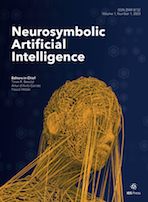Required files
For initial submission a .pdf file of the article is sufficient. After an article has been accepted for publication an editable file of the text, such as MsWord or LateX, is required. When preparing a paper for submission in LaTeX you can use our LaTeX template and use the single column “Royal” option. When using MsWord there is no need to follow a specific template. However, please ensure your heading levels are clear, and the sections clearly defined. For general instructions please see here.
Submitting a paper
Papers must be submitted through this web form. The same web form must also be used when submitting a revised version of a paper: the form has a field for entering the tracking number of the previous version, please also indicate in the cover letter that it is a revision.
Publication costs
The APC for the journal is US$1600 for accepted papers that were submitted September 1, 2025 or later. See https://neurosymbolic-ai-journal.com/content/neurosymbolic-artificial-in... for more details.
Copyright of your article
Authors submitting a manuscript do so on the understanding that they have read and agreed to the terms of the IOS Press Author Copyright Agreement.
Article sharing
Authors of journal articles are permitted to self-archive and share their work through institutional repositories, personal websites, and preprint servers. Authors have the right to use excerpts of their article in other works written by the authors themselves, provided that the original work is properly cited. The consent for sharing an article, in whole or in part, depends on the version of the article that is shared, where it is shared, and the copyright license under which the article is published. Please refer to the IOS Press Article Sharing Policy for further information.
Quoting from other publications
Authors, when quoting from someone else's work or when considering reproducing figures or tables from a book or journal article, should make sure that they are not infringing a copyright. Although in general authors may quote from other published works, permission should be obtained from the holder of the copyright if there will be substantial extracts or reproduction of tables, plates, or other figures. If the copyright holder is not the author of the quoted or reproduced material, it is recommended that the permission of the author should also be sought. Material in unpublished letters and manuscripts is also protected and must not be published unless permission has been obtained. Submission of a paper will be interpreted as a statement that the author has obtained all the necessary permission. A suitable acknowledgement of any borrowed material must always be made.
Submission of extended conference or workshop papers
Authors may submit papers that are extended versions of already published conference or workshop papers. However, the journal version must meet the journal's quality criteria and must clearly go beyond the previously published content, e.g., by providing detailed proofs, a more rigid evaluation, detailed overview of (and comparison to) related work, an implementation, or any other significant contribution that makes the work worth publishing in a journal for archival purpose. Moreover, authors have to ensure that the submitted manuscript does not violate any copyrights that may have been transferred to the entity publishing the previous work. Finally, the submitted manuscript must clearly state the previous publications it is based on.
Review process guidelines
All submitted manuscripts are posted on the journal's website and are publicly available. In addition to solicited reviews selected by members of the editorial board, public reviews and comments are welcome by any researcher and can be uploaded using the journal website. All reviews and responses from the authors are posted on the journal homepage. All involved reviewers and editors will be acknowledged in the final printed version. Solicited reviewers can choose to remain anonymous, but this should only happen in exceptional cases. Please note that authors are, under no circumstances, allowed to approach reviewers directly to discuss reviews. All communication must go through the assigned editor or the editors-in-chief.
Kudos
Authors of published articles (non-prepress, final articles) will be contacted by Kudos. Kudos is a service that helps researchers maximize the impact and visibility of their research. It allows authors to enrich their articles with lay metadata, add links to related materials and promote their articles through the Kudos system to a wider public. Authors will receive no more than three emails: one invitation and a maximum of two reminders to register for the service and link the published article to their profile. Using and registering for Kudos remains entirely optional.
Promoting your work
Would you like some pointers on how to help your research achieve a wider reach and greater impact? Please consult our promotional tools section for tips.
Please visit the IOS Press Authors page for further information.
